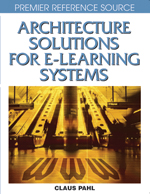Architecture Solutions for E-Learning Systems |

|
 Diese Seite wurde seit 1 Jahr inhaltlich nicht mehr aktualisiert.
Unter Umständen ist sie nicht mehr aktuell.
Diese Seite wurde seit 1 Jahr inhaltlich nicht mehr aktualisiert.
Unter Umständen ist sie nicht mehr aktuell.
 Zusammenfassungen
Zusammenfassungen
 E-learning is now a prominent form of education that allows for the creation of tailored solutions for different learning styles and requirements. An essential element of e-learning, learning technology systems manage the learning environment, learning objects, and resource infrastructures.
E-learning is now a prominent form of education that allows for the creation of tailored solutions for different learning styles and requirements. An essential element of e-learning, learning technology systems manage the learning environment, learning objects, and resource infrastructures.
Architecture Solutions for E-Learning Systems provides fundamental research on the architecture of learning technology systems, discussing such issues as the common structures in LTS architectures and solutions for specific forms such as knowledge-based, distributed, or adaptive applications of e-learning. Researchers, practitioners, and scholars in the fields of learning content software development, computing and educational technologies, and e-learning will find this book an invaluable resource.
 Kapitel
Kapitel 
- Moving Towards a Generic, Service-based Architecture for Flexible Teaching and Learning Activities (Seite 1 - 24)


- Collaborative E-Learning System and E-Pedagogy - Learning Resource Infrastructure for Distributed Knowledge Sharing (Seite 24 - 43) (Toshio Okamoto, Toshie Ninomiya, Mizue Kayama, Naomi Nagata)


- Service-based Grid Architectures to support the Virtualization of Learning Technology Systems (Seite 44 - 61) (Gerard Gleeson, Claus Pahl)


- From e Learning to m Learning - Architectures to Support University Teaching (Seite 62 - 79) (Phillip Grew, Elena Pagani, Francesco Giudici)


- Architectures of Existing and Conceptual Applications of Podcasting in E-learning Systems (Seite 80 - 97) (Stephen R. Chastain, Jason Caudill)


- A Step towards a Pattern Language for e-Learning Systems (Seite 98 - 115) (Andreas Harrer, Alke Martens)


- Model-Driven Engineering (MDE) and Model-Driven Architecture (MDA) applied to the Modeling and Deployment of Technology Enhanced Learning Systems - promises, challenges and issues (Seite 116 - 136) (Pierre Laforcade, Thierry Nodenot, Christophe Choquet, Pierre-Andre Caron)


- Accessibility, Digital Libraries and Semantic Web Standards in an E-Learning Architecture (Seite 137 - 153) (Sean W. M. Siqueira, Maria Helena L. B. Braz, Rubens N. Melo)


- End-User Quality of Experience-Aware Personalized E-Learning (Seite 154 - 174) (Cristina Hava Muntean, Gabriel-Miro Muntean)


- E-learning systems reengineering - Functional specifications and component based architecture (Seite 175 - 196) (Lahcen Oubahssi, Monique Grandbastien)


- An Integrated Architecture for Supporting Vocational Training (Seite 197 - 218) (C. Bouras, E. Giannaka, Th. Tsiatos)


- A Generic Platform for the Systematic Construction of Knowledge-based Collaborative Learning Applications (Seite 219 - 242) (Santi Caballé, Thanasis Daradoumis, Fatos Xhafa)


- From Learning Objects to Adaptive Content Services for E-Learning (Seite 243 - 261) (Peter Brusilovsky, Vincent P. Wade, Owen Conlan)


- An Adaptive e-learning Platform for Personalized Course Generation (Seite 262 - 282) (Enver Sangineto)


- Pedagogical Scenario Modelling, Deployment, Execution and Evolution (Seite 283 - 305) (Yvan Peter, Xavier Le Pallec, Thomas Vantroys)


- Impact of context-awareness on the architecture of learning support systems (Seite 306 - 319) (Andreas Schmidt)


- Design and Evaluation of Web-based Learning Environments using Information Foraging Models (Seite 320 - 339) (Nikolaos Tselios, Christos Katsanos, Georgios Kahrimanis, Nikolaos Avouris)


 Dieses Buch erwähnt ...
Dieses Buch erwähnt ...
 Personen KB IB clear | Jakob Nielsen | ||||||||||||||||||
 Begriffe KB IB clear | ContentContent
,  E-Learning E-Learning E-Learning
, E-Learning
,  Hochschule Hochschule higher education institution
, higher education institution
,  machine learning
, patternpattern
, machine learning
, patternpattern
,  Podcast Podcast Podcast
, Podcasts in educationPodcasts in education
, ReengineeringReengineering
, Semantic Websemantic web
, social network analysissocial network analysis
, TopClass
, Podcast
, Podcasts in educationPodcasts in education
, ReengineeringReengineering
, Semantic Websemantic web
, social network analysissocial network analysis
, TopClass
,  Universität Universität university university
| ||||||||||||||||||
 Bücher |
|
 Dieses Buch erwähnt vermutlich nicht ...
Dieses Buch erwähnt vermutlich nicht ... 
 Nicht erwähnte Begriffe | Blended Learning, Learning Management System (LMS) / Lernplattform, RDF |
 Tagcloud
Tagcloud
 Zitationsgraph (Beta-Test mit vis.js)
Zitationsgraph (Beta-Test mit vis.js)
 Volltext dieses Dokuments
Volltext dieses Dokuments
 Bibliographisches
Bibliographisches 
 Beat und dieses Buch
Beat und dieses Buch
Beat hat dieses Buch während seiner Zeit am Institut für Medien und Schule (IMS) ins Biblionetz aufgenommen. Beat besitzt kein physisches, aber ein digitales Exemplar. Eine digitale Version ist auf dem Internet verfügbar (s.o.).









 , 1920 kByte;
, 1920 kByte;  Link unterbrochen? Letzte Überprüfung: 2021-03-21 Letzte erfolgreiche Überprüfung: 2015-02-28)
Link unterbrochen? Letzte Überprüfung: 2021-03-21 Letzte erfolgreiche Überprüfung: 2015-02-28) 
 Biblionetz-History
Biblionetz-History